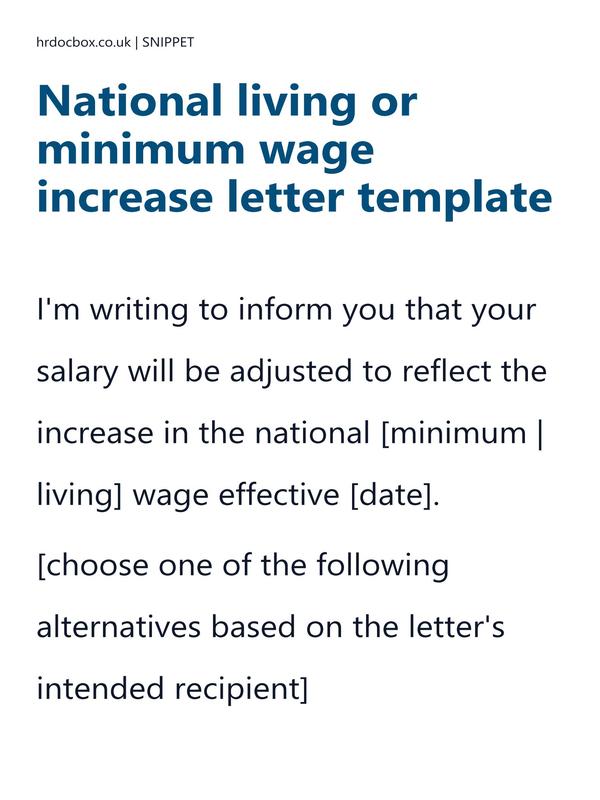National living or minimum wage increase letter template


This letter should be given to an employee informing them of a pay increase due to an increase in the National Minimum or Living Wage rates.
The letter specifies the new rate of pay and the dates it will be effective.
- Includes 12 months' access to the National living or minimum wage increase letter template, with all updates provided free of charge and notified to you.
- UK-specific accuracy.
- 313 words over 2 pages.
- Last updated 03/04/2024.
- Format: Word / plain text / email.
- Delivery: Instant download after purchase (no physical item).
- Access: Download link shown here after checkout.
- This National living or minimum wage increase letter template will SAVE you up to 1 hour drafting & research, save you money, and reduce your risk.
[Sender name]
[Sender address]
[date]
[Recipient name]
[Recipient address]
Dear [Recipient first name],
Salary increase
I'm writing to inform you that your salary will be adjusted to reflect the increase in the national [minimum | living] wage effective [date].
[choose one of the following alternatives based on the letter's intended recipient]
[Option 1 - worker aged 21 and over]
From [date], the rate of the national living wage for workers who are aged 21 or over is increasing from £[amount] to £[amount] per hour.
[Option 2 - worker aged 18 to 20]
From [date], the rate of the national minimum wage for workers who are aged 18 to 20 is increasing
This is a 30% preview of the National living or minimum wage increase letter template. For instant full access, purchase this item or a parent bundle.
National living or minimum wage increase letter template purpose
A National Minimum or Living wage increase letter is a document that is sent by an employer to their employees to inform them of an upcoming increase in the national minimum or living wage. This letter is typically sent out before the increase takes effect and is intended to notify employees of their new wage rate. The letter may also include information about any changes to employee benefits or policies that may accompany the wage increase.
This is an important communication tool that allows employers to inform their employees of changes to their compensation and helps ensure compliance with legislation.
Minimum wage rates can be found at https://www.gov.uk/national-minimum-wage-rates.
Practical application of a National living or minimum wage increase letter template
- The National living or minimum wage increase letter template should be actioned / delivered ideally, no later than two weeks prior to the minimum wage rate change (usually april).
- It is sent / delivered by an employer / HR team to an employee.
Compliance
Compliance
This National living or minimum wage increase letter template incorporates relevant UK laws and HR standards, including those listed below:
-
The National Minimum Wage Act 1998: This sets out the legal minimum hourly rates that employers must pay their workers, and the criteria for determining eligibility for the minimum wage. Employers must ensure that they are paying their employees at or above the minimum wage rate.
-
The Employment Rights Act 1996: This outlines the statutory rights that employees have with regard to pay, including the right to receive a written statement of pay and deductions.
-
The Working Time Regulations 1998: This sets out the rules on maximum weekly working hours and rest breaks, which can impact the calculation of the minimum wage.
-
The Equality Act 2010: This prohibits discrimination on the grounds of age, gender, race, religion, disability, and other protected characteristics in relation to pay and employment. Employers must ensure that any pay increases are implemented fairly and without discrimination.
-
The Employment Relations Act 1999: This sets out the requirements for informing and consulting employees on employment matters, including changes to pay and conditions. Employers must consult with their employees on any changes to the minimum wage rate and ensure that they are given notice of any upcoming increase.
-
The National Minimum Wage Regulations 2015: This provides additional guidance on the calculation and payment of the minimum wage, including the treatment of tips and deductions. Employers must ensure that they are following these regulations when implementing a minimum wage increase.
Practical example
Practical example
Instantly unlock with a purchase.
Instantly unlock with a purchase.
Scenario: Implementation of National Living or Minimum Wage Increase
ABC Limited, a UK-based company, prepares to implement the government-mandated increase in the National Living Wage (NLW) or National Minimum Wage (NMW) for its employees. HR Manager Sarah oversees the process to ensure compliance with legal requirements and fair treatment of employees.
Notification of Wage Increase
Sarah is aware of the upcoming increase in the NLW or NMW. She verifies the details of the increase, including the effective date and new hourly rate, and ensures that ABC Limited is prepared to implement the changes accordingly.
Assessment of Impact
Sarah assesses the impact of the wage increase on ABC Limited's workforce, considering factors such as current wage rates, employee classifications, and budgetary constraints. She analyses how the increase will affect different employee groups and departments within the organisation.
Communication Plan
Sarah develops a communication plan to inform employees about the upcoming wage increase. The plan includes clear and concise messaging about the change, its rationale, and how it will be implemented. Sarah ensures that communication channels such as email, staff meetings, and notice boards are used to reach all employees effectively.
Implementation Process
On the effective date of the wage increase, Sarah ensures that payroll systems are updated to reflect the new hourly rates for affected employees. She coordinates with the finance department to verify the accuracy of wage calculations and address any discrepancies promptly.
Monitoring and Compliance
Sarah monitors compliance with the NLW or NMW regulations following the wage increase. She conducts regular audits to ensure that all employees are paid at least the statutory minimum wage rate and addresses any non-compliance issues promptly and appropriately.
Frequently Asked Questions about a National living or minimum wage increase letter template
Frequently Asked Questions about a National living or minimum wage increase letter template
-
Can I use the National living or minimum wage increase letter template in my small business?
Yes. The National living or minimum wage increase letter template is designed to be flexible and suitable for organisations of all sizes, including small businesses and charities. It follows UK employment law best practice, so even if you don't have an in-house HR team, you can confidently apply it.
-
Is the National living or minimum wage increase letter template compliant with 2026 UK employment law?
Absolutely. Like the National living or minimum wage increase letter template, all of our templates are drafted with the latest ACAS guidance and UK employment legislation in mind. We review and update them regularly, so you can be confident they remain compliant.
-
Can I customise the National living or minimum wage increase letter template for my organisation?
Yes, we highlight the areas of the National living or minimum wage increase letter template that you need to update with your own details, and where you need to make decisions to suit your situation. This saves you time and ensures that you meet best practice.
-
Do I get instant access to the National living or minimum wage increase letter template?
Yes. Once purchased, you'll be able to download the National living or minimum wage increase letter template instantly. Templates are provided in editable Word or Excel format so you can customise them easily, and in PDF format for easy sharing.
-
What if I need more help, not just a National living or minimum wage increase letter template?
If you're looking for broader support, we also offer toolkits and library bundles that include the National living or minimum wage increase letter template, along with other HR templates and policies for fully managing your situation. These may be more cost-effective if you need deeper advice.
-
Why should I use this National living or minimum wage increase letter template, and not AI to generate it?
The risk of using a free AI-generated template 'without review' includes your legal exposure, missing context, and no awareness of the wider process, whereas purchasing the National living or minimum wage increase letter template from us mitigates that risk.
